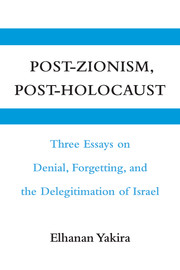Appendix: Biographical Notes
Published online by Cambridge University Press: 05 June 2012
Summary
Yehuda Bauer (b. 1926) is a historian of the Holocaust and a professor at the Hebrew University of Jerusalem.
Azmi Bishara (b. 1956) was a member of the Knesset (Israeli parliament), representing the Balad (National Democratic Alliance) Party, from 1996 until his resignation in April 2007, following charges of treason and espionage brought against him by the General Security Services. He left the country and has remained abroad since then. Bishara received a PhD in philosophy from Humboldt University of Berlin in 1986 (his thesis was on the philosophy of Karl Marx) and joined the faculty of Bir Zeit University (in the West Bank), where he headed the Department of Philosophy and Department of Political Science. Since 1990, he has also worked as a researcher at the Van Leer Jerusalem Institute. His books have been published in Arabic, Hebrew, English, French, and German. Selected publications: Die Jerusalemfrage: Israelis und Palätinenser im Gespräch (with Uri Avnery, 1996), The Palestinian Elections: An Assessment (1997), The Arabs in Israel (2003).
Yosef Grodzinsky is a professor in the Department of Psychology at Tel Aviv University and the Department of Linguistics, McGill University, Montreal, working mainly in the field of neurolinguistics. He is interested in the neurological instantiation of formal syntactic and semantic knowledge, which he has been studying in both sickness and health.
- Type
- Chapter
- Information
- Post-Zionism, Post-HolocaustThree Essays on Denial, Forgetting, and the Delegitimation of Israel, pp. 331 - 334Publisher: Cambridge University PressPrint publication year: 2009



